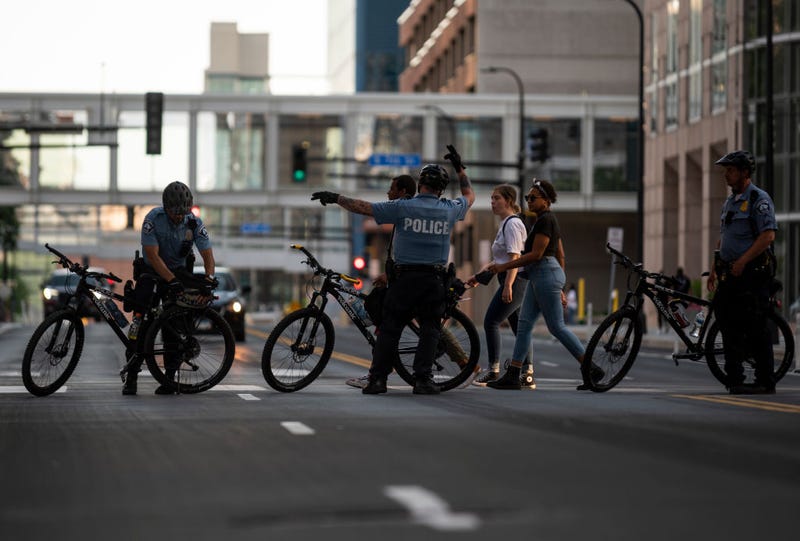
In just a few days, it'll have been five years since George Floyd's murder by former Minneapolis Police Officer Derek Chauvin.
Under that shadow, some state leaders are pushing back on the Department of Justice's decision to end federal oversight of Minneapolis Police. A federal investigation under the Biden Administration found that the Minneapolis Police Department engaged in unconstitutional practices, and recommenced nearly 30 reforms for the department and city.
Minnesota Attorney General Keith Ellison says the decision to disrupt that work sends the wrong message.
"Not only is this an insult to the family of George Floyd and everybody who protested, it is an insult to the members of law enforcement who came forward to testify in good faith and try to tell what changes need to be made," Ellison said Thursday.
He added that city plans to proceed with the federal guidelines anyway, and a state agreement will continue to ensure accountability at the department despite the decision from the Trump Administration.
However, Ellison says it's a move that threatens years of critical efforts in Minneapolis.
"We should protest this. We should speak against this, even though Trump's not gonna hurt Minnesota because we have our own," the attorney general explained. "It still is a sign of contempt and it is a sign of disrespect. And it is a clear sign that Trump doesn't give a damn."
He called the move another step toward "state repression" by those in power.
Meanwhile, the Minnesota chapter of the Council on American-Islamic Relations is announcing their own opposition to the end of federal oversight of Minneapolis police reform.
Executive Director Jaylani Hussein says it sends the unfortunate message that the government has no interest in reforming and improving policing in Minnesota or anywhere in the country. The Justice Department also dropped reform agreements in Louisville and other U.S. cities on Wednesday.
“After the numerous instances of police brutality we have seen over the past few years, the beginning of joint local and federal efforts at reform were a positive development," says Hussein. "We urge Minneapolis authorities to continue working toward reform.”
Minneapolis Mayor says they're making progress anyway
Minneapolis Mayor Jacob Frey also reacted to some comments from the Department of Justice saying the consent decrees often turns power over to "unelected and unaccountable bureaucrats." Frey told WCCO's Chad Hartman that's not what is happening in Minneapolis.
"Well, I don't have an anti-police agenda," Frey begins. "I very much support police officers because it is an honorable and very important profession. And simultaneously, I think it's fair to want police officers to have the best possible conduct, to be providing good constitutional policing, to be operating within the law, and we have done the work with the former Department of Justice to make sure that we've got a roadmap to make these important changes. Just because Donald Trump wants to step away from that police reform doesn't mean we need to step away from it."
Minneapolis is already working under a similar agreement with the Minnesota Department of Human Rights and Frey says while there is much work to be done, they are making progress.
"We're not going to hit all the items," Frey explains. "So there will be areas where we don't meet a deadline or we fall short. Because guess what, they're aggressive."
So what happens when you don't hit those points?
"It will be shown very publicly that we did not hit the points just like it would be if there was a consent decree in place through the federal government," said the mayor. "Really there's there's no difference in that sense. You're held accountable for not hitting those pieces and you continue on with the work until you do."
Frey also addressed the rumors which are - at this point - unfounded, that President Trump could consider pardoning Derek Chauvin for his federal conviction, and that it could even be timed to happen on the five year anniversary of Floyd's death. Frey says it's political theater, and wouldn't really change Chauvin's situation anyway.
"We don't have any intelligence at this point that they're going down that route. Is it possible that they're hiding it until the last minute? Of course it's possible," says Frey. Now, we also know that Donald Trump is about pure political theater. I mean, that's why I believe they waited until the week of the anniversary of George Floyd's murder to attempt to dismiss the consent decree. I mean, they could have done this at any time in the previous several months, but instead they asked for extension after extension to this point. So, could Donald Trump do some political theater with the pardon of Derek Chauvin too? Yeah, of course. But it would be just that because the only thing that it would change if you pardoned Derek Chauvin is the prison that he was located in."
Chauvin is currently serving a federal sentence concurrently with his state sentence at a federal prison in Texas. Even if Trump were to pardon Chauvin, he would be moved to Minnesota's state system to serve out his sentence.
